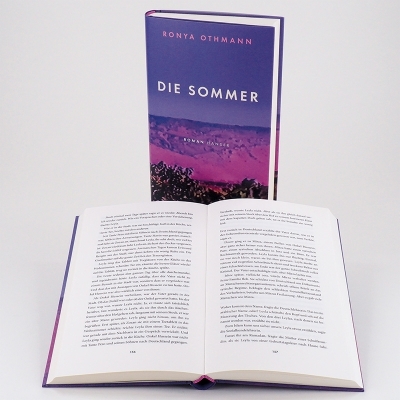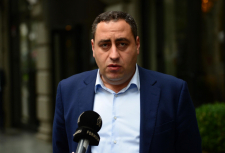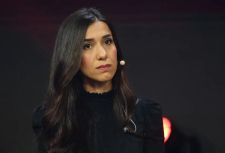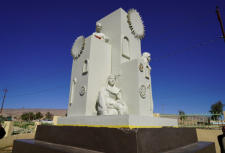Between two worlds

Ronya Othmann's debut novel is a special kind of history lesson: a sensitive and heart-wrenching story that introduces us to the Yazidis, to the war-torn world of the author’s grandparents in Syria.Leyla, the main character of Die Sommer (The Summers), grows up in Munich and later studies in Leipzig. Her mother is a German nurse, her father a Yazidi Kurd from Syria, who works in construction in Germany. Before fleeing from Syria, he dreamed of going to college, but was denied admission because he was a Yazidi, a stateless member of an ethnoreligious minority within the Kurdish minority in Syria. Leyla lives in two worlds: the world of her Munich high school and German friends during the school year, and her paternal grandparents’ Kurdish village in Syria during the summer holidays.
Family history
Although based on autobiographical elements, the story is fictional and told on two different levels: On the one hand, there’s Leyla and her memories of summers spent walking down dusty roads, rolling stuffed vine leaves or sitting around with her grandparents on mattresses in their living room, sipping tea and braving the heat under a whirring ceiling fan. On the other hand, there’s Leyla's father, who tells her the harrowing tale of his escape. Othmann strikes just the right note. Her prose is plain and yet artful: it seems that such a cruel story of forced displacement, torture and injustice can only be palpably conveyed in such simple words:
Her father laughed sadly and said over the phone: It's strange, but now, for the first time, the Germans know who we are. Her mother said: I can't take anymore. We’ve been watching this non-stop for three years. And now Shangal. Who can endure this, for four long years, asked her mother. It’s unbearable. The worst thing, Leyla said, is watching. I can't watch anymore.
Ronya Othmann
Their conversation refers to the Yazidi genocide perpetrated by the Islamic State of Iraq and the Levant (ISIL). In August 2014, the terrorist organization attacked and massacred the so-called "infidels" in Sinjar, the main area of Yazidi settlement in northern Iraq. Leyla’s father was already in Germany at the time, sitting in front of the TV watching the foreign coverage of the massacre on one channel after another for hours on end.
Award-winning author
Ronya Othmann, a former taz columnist, has already won several awards, including the Ingeborg Bachmann People’s Choice Award at last year’s German-language literary festival in Klagenfurt, Austria, for her personal essay Vierundsiebzig (Seventy-four), also about the genocide of the Yazidis. Othmann is currently studying literature at the University of Leipzig whilst working on her next novel. In a video interview conducted by Regine Hader of the Goethe-Institut on the occasion of the 2020 Frankfurt Book Fair, she recounts that she was initially planning to write a journalistic feature, but gave up because her expository prose skills were inadequate to the task. So she ended up writing a novel, which was more suited to her use of language, memory, storytelling and the art of narrative.
Definitely recommended reading
Die Sommer is worth reading if only because it is a heart-wrenching story that can also teach us a lot – about the Yazidis, their religion and their fate. It’s an important book because it shows us what it means to lose your homeland. Last but not least, it is capable of eliciting understanding and acceptance, without lecturing the reader.
By-Swantje Schütz
Tags: #yazidisinfo #newsyazidi #ezidi #aboutyazidi #RonyaOthmann's #genocideyazidi
Between two worlds

Ronya Othmann's debut novel is a special kind of history lesson: a sensitive and heart-wrenching story that introduces us to the Yazidis, to the war-torn world of the author’s grandparents in Syria.Leyla, the main character of Die Sommer (The Summers), grows up in Munich and later studies in Leipzig. Her mother is a German nurse, her father a Yazidi Kurd from Syria, who works in construction in Germany. Before fleeing from Syria, he dreamed of going to college, but was denied admission because he was a Yazidi, a stateless member of an ethnoreligious minority within the Kurdish minority in Syria. Leyla lives in two worlds: the world of her Munich high school and German friends during the school year, and her paternal grandparents’ Kurdish village in Syria during the summer holidays.
Family history
Although based on autobiographical elements, the story is fictional and told on two different levels: On the one hand, there’s Leyla and her memories of summers spent walking down dusty roads, rolling stuffed vine leaves or sitting around with her grandparents on mattresses in their living room, sipping tea and braving the heat under a whirring ceiling fan. On the other hand, there’s Leyla's father, who tells her the harrowing tale of his escape. Othmann strikes just the right note. Her prose is plain and yet artful: it seems that such a cruel story of forced displacement, torture and injustice can only be palpably conveyed in such simple words:
Her father laughed sadly and said over the phone: It's strange, but now, for the first time, the Germans know who we are. Her mother said: I can't take anymore. We’ve been watching this non-stop for three years. And now Shangal. Who can endure this, for four long years, asked her mother. It’s unbearable. The worst thing, Leyla said, is watching. I can't watch anymore.
Ronya Othmann
Their conversation refers to the Yazidi genocide perpetrated by the Islamic State of Iraq and the Levant (ISIL). In August 2014, the terrorist organization attacked and massacred the so-called "infidels" in Sinjar, the main area of Yazidi settlement in northern Iraq. Leyla’s father was already in Germany at the time, sitting in front of the TV watching the foreign coverage of the massacre on one channel after another for hours on end.
Award-winning author
Ronya Othmann, a former taz columnist, has already won several awards, including the Ingeborg Bachmann People’s Choice Award at last year’s German-language literary festival in Klagenfurt, Austria, for her personal essay Vierundsiebzig (Seventy-four), also about the genocide of the Yazidis. Othmann is currently studying literature at the University of Leipzig whilst working on her next novel. In a video interview conducted by Regine Hader of the Goethe-Institut on the occasion of the 2020 Frankfurt Book Fair, she recounts that she was initially planning to write a journalistic feature, but gave up because her expository prose skills were inadequate to the task. So she ended up writing a novel, which was more suited to her use of language, memory, storytelling and the art of narrative.
Definitely recommended reading
Die Sommer is worth reading if only because it is a heart-wrenching story that can also teach us a lot – about the Yazidis, their religion and their fate. It’s an important book because it shows us what it means to lose your homeland. Last but not least, it is capable of eliciting understanding and acceptance, without lecturing the reader.
By-Swantje Schütz
Tags: #yazidisinfo #newsyazidi #ezidi #aboutyazidi #RonyaOthmann's #genocideyazidi


























